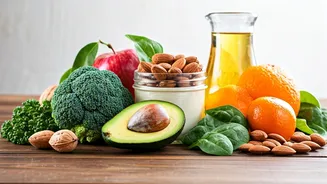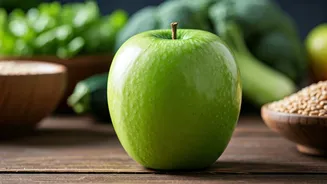Healthy Fats
Incorporating foods rich in healthy fats is a beneficial way to improve HDL cholesterol. Avocados, with their creamy texture, are packed with monounsaturated
fats, and are easy to add to salads, sandwiches, or even enjoy on their own. Similarly, olive oil, a staple in many cuisines, offers monounsaturated fats and can be used in cooking or as a flavorful dressing. Nuts, like almonds and walnuts, also contribute healthy fats and fiber, providing a satisfying and beneficial snack that contributes to improved cholesterol profiles. When these are consumed regularly, it results in positive impacts on the HDL levels.
Fatty Fish Power
Fatty fish, such as salmon, mackerel, and sardines, are excellent sources of omega-3 fatty acids, which not only contribute to heart health but also help in increasing HDL cholesterol levels. These fish can be grilled, baked, or even enjoyed in salads, making them versatile additions to the diet. The regular consumption of these types of fish is linked to numerous heart health benefits. Omega-3s help reduce inflammation and improve overall cardiovascular function, which supports the increase in the HDL levels, leading to a healthier heart.
Fiber-Rich Goodness
Fiber, especially soluble fiber, has a positive impact on HDL cholesterol levels. Oatmeal, a breakfast favorite, is a great source of soluble fiber, making it an excellent choice to start the day. Apples and pears, readily available fruits, also contain soluble fiber and can be eaten as snacks. Legumes, including beans and lentils, provide substantial fiber and are easy to incorporate into soups, stews, or salads. Regular consumption of these fiber-rich foods helps maintain healthy HDL levels and contributes to better overall health, especially for the heart.
Colorful Veggies
Colorful vegetables, such as spinach, carrots, and sweet potatoes, are packed with vitamins, minerals, and antioxidants, supporting overall health and potentially boosting HDL. Spinach can be added to salads or cooked as a side dish, and carrots can be enjoyed raw as a snack or cooked in various dishes. Sweet potatoes offer a sweet and nutritious option that can be baked or mashed. These vegetables contribute to healthy HDL levels and provide various other health benefits.
Spice it Up!
Adding spices to your diet is another way to support heart health and positively impact HDL cholesterol. Turmeric, containing curcumin, has anti-inflammatory properties that contribute to cardiovascular health. Garlic, used in many cuisines, offers numerous health benefits, including potential positive effects on cholesterol levels. Including spices in your diet adds flavor and supports HDL levels, boosting the benefits for the heart and overall well-being. Using these spices regularly enhances the taste and contributes to a healthier heart profile.
Soy's Benefit
Soy products, such as tofu and edamame, are a source of protein and other nutrients, which contribute to improved cholesterol profiles. Tofu can be used in a variety of dishes, from stir-fries to salads. Edamame, which are young soybeans, provide a nutritious and tasty snack option. Incorporating soy into the diet can help in increasing HDL cholesterol levels. It offers a healthy option for supporting heart health and improving overall cholesterol profiles.
Moderate Alcohol
If you consume alcohol, doing so in moderation can have some benefits for heart health and may also contribute to the increase in HDL cholesterol levels. However, it’s important to practice moderation. Guidelines typically suggest up to one drink per day for women and up to two drinks per day for men. Red wine, in particular, has been linked to potential heart-healthy benefits due to the antioxidants it contains. Consulting a healthcare professional regarding alcohol consumption is advisable to ensure it aligns with individual health needs and goals.














